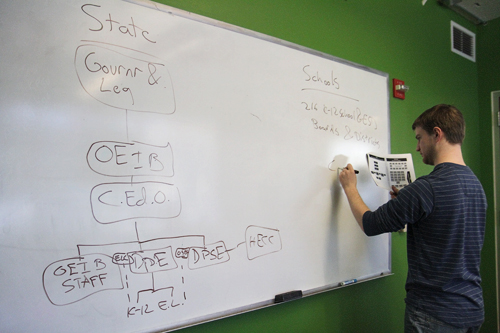The Oregon legislature opened for business on Monday, and Gov. John Kitzhaber is expected to implement sweeping educational reforms. The reforms are part of the Oregon 40-40-20 goal to see 40 percent of Oregonians with a four-year degree by 2025. Because of the weighty and unprecedented nature of the reforms, many Portland State and Oregon University System administrators are unsure exactly how this will happen or what the effects will be.
Education reform on legislative agenda

The Oregon legislature opened for business on Monday, and Gov. John Kitzhaber is expected to implement sweeping educational reforms.
The reforms are part of the Oregon 40-40-20 goal to see 40 percent of Oregonians with a four-year degree by 2025. Because of the weighty and unprecedented nature of the reforms, many Portland State and Oregon University System administrators are unsure exactly how this will happen or what the effects will be.
The most important thing students need to know, according to University Communications Director Scott Gallagher, is that what happens in Salem affects them.
Institutional boards
One issue that is sure to get play this year is that of institutional boards. Diane Saunders, communications director for OUS, provided some background. Because Oregon universities have received less funding from the legislature every budget cycle for several cycles, interactive ways were sought to solve the problems this created.
In 2009, an idea was born: Let universities opt to have their own boards of directors instead of being governed by the chancellor’s office.
This would allow universities to make many of their own decisions and set their own tuition. This year there are proposals in several House and Senate bills to give Portland State its own institutional board.
Proponents of the idea say it will allow the school to bring in more philanthropy funding, Saunders said. It would create the possibility for more scholarships and allow the school to move faster in real estate and construction projects. In short, it would allow PSU to run more autonomously.
Smaller public universities such as Western Oregon University criticize the idea, saying it could create unnecessary overhead if each university were to create its own administrative structure. It could also force schools like WOU to compete rather than cooperate with larger schools, since they lack the political resources to create their own institutional boards.
Either way, the question may be settled during this legislative session.
The bottom line for students, said Associated Students of Portland State University representatives, is that a board could easily affect what tuition costs next year.
Tuition equity
Another hot-button issue for students will be tuition equity proposals, according to ASPSU Communications Director Anthony Stine. He thinks this is the year the proposal will be approved by the Legislature after more than 10 years of consideration.
Stine explained that the proposal will allow all students who graduate from an Oregon high school to pay in-state tuition. This is a big deal because it would allow undocumented immigrant students who have attended public secondary school in Oregon to also attend college.
The Oregonian reported that there are already 100,000 undocumented immigrants living in Oregon, and the intent of the legislation is to help provide a path to citizenship.
Stine said that there had been an issue with Republicans and Democrats disagreeing on this issue, but they had recently come together in the 2012 election. Stine also suspects that the proposal will increase college funding because it will bring in more students.
Oregon Opportunity Grant
ASPSU Legislative Affairs Director Dave Coburn explained another pressing issue. Currently, eight out of 10 students who qualify for the Oregon Opportunity Grant aren’t receiving it, he said. This is because the state runs out of money for students who don’t apply early.
One proposal would make Oregon sell bonds to create a larger fund for the Oregon Opportunity Grant. It would have to be approved by the Oregon voters after the Legislature approved it. Coburn said this is a major priority for ASPSU, and that ASPSU is on the same page as the PSU administration.
Another issue is approval of the state’s budget. Saunders said it will increase the amount of money higher education receives by 6.6 percent from the last budget. It’s still less than what higher education got back in 1999–2001, though, she said.
“If we get less than the governor’s budget, tuition will cost more,” Saunders said.
One of OUS’ biggest priorities, she added, is to help the Legislature approve the proposed amount, since the Legislature can make changes to the budget.
The budget also creates an entirely new Department of Post-Secondary Education, with controversial new figure Rudy Crew in charge of the reorganized education structure.
Crew will help to implement all the education reforms in Oregon and fulfill the Oregon 40-40-20 plan.
The new budget will be implemented in July after the Legislature approves it.
An important thing to remember about all of the educational reforms, Coburn said, is that no one entirely knows what this stuff means yet since much of it is new.
“This legislative session is going to be interesting,” he said.






